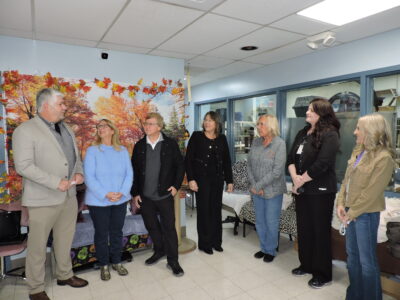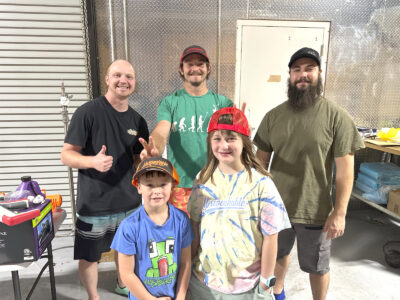Volunteers helping residents find ancestors
Tri-State Genealogical Society continues helping area residents
NEWELL — Have you ever really thought about your past or considered where it is that your family’s ancestors originated from?
Have you ever asked yourself who, if anyone, you resemble? Or maybe contemplated if anybody from the distant past was perhaps famous?
Were you ever curious if someone who was related to you made a difference or an impact on the world during their lifetime?
For those who are wondering, those who are ready to find out those answers, help could be right around the corner.
And that corner can be found at 717 Washington St. in Newell.
It is home to the Tri-State Genealogical and Historical Society, whose mission is to help people pore through their family history.
Previously located in the Carnegie Public Library in East Liverpool, the nonprofit organization is now housed in the former Wells School building across from the Homer Laughlin China Co.
The organization’s volunteers explained they are dedicated to preserving the history of the Tri-State Area, focusing primarily on Ohio, Pennsylvania and West Virginia.
Since being formed in 2002, one of the society’s major goals is to help local residents trace their family history, according to Eileen Collins of Chester, who serves as vice president of the nonprofit.
Collins is a volunteer who serves alongside Martha Gittings, Myrtle Chupa, Renee Burdine and Jennifer Bryan, volunteers who help run the genealogical society.
The women explained their president, Karen Stewart, had a stroke in December, resulting in their having to step up and work even harder to help keep the agency afloat.
Not too many area residents are aware of the group’s need for assistance, as there is no money to be made. Volunteers rely solely on individual contributions — and that is just to pay the rent and utility bills inside the lower level of the former school.
Gittings, a Weirton resident, noted the women have been trying to sell T-shirts, candy bars and beef jerky to try to make ends meet.
Collins added there are some local history books for sale, as well.
Another option is to become a member of the society at the cost of $15 per year. Currently, there are 29 members; however, only five are active, Gittings said.
She explained approximately 30 letters were mailed out Saturday, addressed to former members of the society as a means to try to add to its membership total. Inquiries have been sent to current members to see if they would be interested in volunteering more.
Because the society has been struggling, its hours have dwindled. Prior to COVID, the office was operating three or four days a week. However, following the pandemic, officials noted they were “never able to bounce back.” Today, the society is open only on Saturdays from 10 a.m. to 2 p.m.
Gittings added if anyone is unable to visit on Saturdays, arrangements can be made for an appointment during the week. A message can be left on the answering machine and the call will be returned.
So, what exactly makes the Tri-State Genealogical and Historical Society different from other area organizations?
Those seeking to explore their family history can discover what resources can be found within the society’s library, as the research room contains in-house references having a strong emphasis on Pennsylvania, Ohio and West Virginia. These include numerous volumes of county histories, city directories, obituary files, census records, cemetery records and recently acquired newspapers on microfilm and CDs.
Visitors can have a page copied from one of the reference materials at the cost of 10 cents each. Copies made from microfilm or a computer printout will cost 25 cents each, Collins noted.
The genealogical society houses census books going back to the 1880s.
Family trees can also be done by using sites such as Ancestry and Family Search, Collins commented. She and Gittings explained some of these family history websites break down into three branches: The United States, the world and universal searches. Ultimately, users can end up paying around $400 for a six-month subscription — whereas these services are provided free of charge through the genealogical society, which charges only the cost of the printouts.
“We had a lady come in last week looking for her grandfather’s wife’s name,” Gittings exclaimed. “We took her back six generations to 1692. She just couldn’t believe it.”
According to the volunteers, there are three main references which always leave some kind of a paper trail on an individual: A marriage certificate, a death certificate and a birth certificate.
These papers serve as proof that a family member has actually existed and are often sought by patrons. Volunteers explained that just because somebody may come across a posting on the Internet, does not make it an actual fact. People have been known to give false information, and therefore, physical documentation is needed when performing a search.
Collins stated that searches can be complicated and people often hit a brick wall. But despite the complications, the searches can become very interesting, she added.
Gittings agreed, saying it can become a hobby — and a very addicting one, at that.
Chupa knows firsthand about that addiction, saying she first came to the organization approximately six years ago looking to find out about her great-grandmother. She ended up volunteering and becoming a member. To this day, she continues to research members of her family, because as she puts it, “You just have to look for one more.” Addictive, indeed.
The women stated many people never knew their grandparents and seek information about them.
“We can go as far back as the 1600s in the U.S., and go back further in other countries,” Gittings stated, with Collins noting naturalization papers are helpful in cases such as this.
Bill and MaryJean McIntosh of New Cumberland first heard about the genealogical society through a workshop held at the Hancock County Senior Center. The couple visited the society in search of help on March 29. It was the first time Bill had sought out the nonprofit agency for help finding his family tree for the sake of his grandchildren.
MaryJean explained, “It is all interesting to me,” talking about finding marriage licenses, death records and the names of relatives from long ago. “If you do not know the exact dates, there are books to help you get to that date,” she added.
She stated her husband is the one who got her interested in genealogy, noting when the couple married, he was in the military overseas. While stationed, the two visited where his family originated from, but they were too young at the time to appreciate what information was available to them then.
Bill explained his family left to move to Ontario, Canada, and later, his grandfather moved to Detroit in 1925, and later, retiring from Weirton Steel as a train operator — which explains how he ended up living here. He discovered his grandmother was not his first wife. His grandma came from Belgium, he said, adding now that his family is all gone, he is looking up all the information he can find for his grandchildren. He said of his findings, he performed his own research, but “ends up going down a rabbit hole.”
“I’m not well aware of all the resources out there,” Bill commented. “I don’t know how to use them.”
So, he turned to the Tri-State Genealogical and Historical Society for assistance.
The volunteers are happy to help anyone interested in researching their family history. Appointments are not necessary, unless requesting a day aside from Saturday.
Gittings announced there are other small businesses located inside the former Wells School building that residents may be interested in visiting, including the selling of yard sale items.
These businesses are open on Saturdays, with setup taking place outdoors or inside during inclement weather. Entry to all of the rooms is in the rear of the building.
For information or to make an appointment with the genealogical society, call (304) 387-2467.


